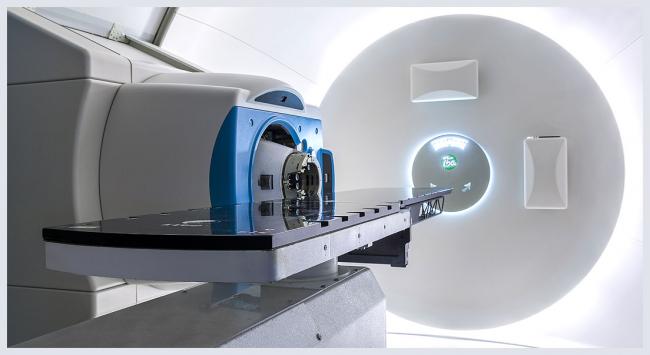The precise nature of proton therapy makes it an excellent option for the treatment of head and neck cancers, including squamous cell carcinoma.
Since proton therapy can deliver highly effective doses of radiation with minimal side effects, the risk of damage to non-cancerous tissue in the head and neck is decreased. Physicians are better able to control the exact point at which the proton beam deposits its energy, so the cancer receives more radiation, while sensitive structures like the jawbone, salivary glands, eyes and spinal cord receive less radiation. This lowers the risk of side effects like bone injury and permanent dryness of the mouth. 1-4
- Tumors of Cranial Nerves
- Schwannoma (Acoustic Neuroma)
- Esthesioneuroblastoma
- Orbital Tumors
- Optic Nerve Sheath Meningioma
- Optic Nerve Glioma
- Lacrimal Gland/Lacrimal Sac Tumors
- Head And Neck Cancers
- Nasal Cavity And Paranasal Sinus
- Nasopharnyx
- Skin With Perineural Invasion
- Oropharynx: Tonsil, Base Of Tongue
- Oral Cavity
- Skull Base And Spine
- Chordomas
- Chondrosarcomas
Proton therapy is one of the least invasive, and most promising tools in use today – especially for cancers of the head and neck.
When Proton Therapy Is Used to Treat Cancer of the Head and Neck
Proton therapy may be used alone to treat head and neck cancer, or it may be used in conjunction with other therapies – including surgery, traditional radiation, and/or chemotherapy.
Small tumors that have not spread to the lymph nodes in the neck are usually treated with one method (radiotherapy – including proton therapy – or surgery). More advanced head and neck cancers, however, are usually treated with a combination of radiotherapy and surgery – with or without chemotherapy.
Proton therapy for cancer treatment makes particular sense for cancers of the head and neck. Precise doses of radiation mean cancers can be treated more aggressively – with a lower risk of damage to healthy tissue.
Since the anatomy of the head and neck is complex, the best course of treatment is determined by the cancer’s location, the extent of the cancer and the medical condition of the patient. To find out how proton therapy may be able to help you, contact the University of Florida Health Proton Therapy Institute today.
1 Dagan R, Bryant CS, Li Z, Yeung D, Justice J, Dzieglewiski P, Werning J, Fernandes R, Pirgousis P, Lanza DC, Morris CG, Mendenhall WM. Outcomes of Sinonasal Cancer Treated With Proton Therapy. 2016 May; 95(1):377-85. Int J Radiat Oncol Biol Phys. doi:10.1016/j.ijrobp.2016.02.019. Epub 2016 Feb 11.
2 Patel SH, Wang Z, Wong WW, Hassan Murad M, Buckey CR, Mohammed K, Alahdab F, Altayar O, Nabhan M, Schild SE, Foote RL. Charged Particle Therapy Versus Photon Therapy for Paranasal Sinus and Nasal Cavity Malignant Diseases: A Systematic Review and Meta-Analysis. Lancet Oncol. 2014 June 27.
3 Gunn GB, Blanchard P, Garden AS, Zhu XR, Fuller CD, Mohames AS, Morrison WH, Phan J, Beadle BM, Skinner HD, Sturgis EM, Kies MS, Hutcheson KA, Rosenthal DI, Mohan R, Gillin MT, Frank SJ. Cliniical Outcomes and Patterns of Disease Recurrence After Intensity Modulated Proton Therapy for Oropharyngeal Squamous Carcinoma. Int J Radiat Oncol Biol Phys. 2016 Feb 4.
4 Sio TT, Lin HK, Shi Q, Gunn GB, Cleeland CS, Lee JJ, Hernandez M, Blanchard P, Thaker NG, Phan J, Rosenthal DI, Garden AS, Morrison WH, Fuller CD, Mendoza TR, Mohan R, Shelley Wang, X, Frank SJ. Intensity-Modulated Proton Therapy (IMPT) versus Intensity-Modulated Photon Radiotherapy (IMRT) for Oropharyngeal Cancer: First Comparative Results of Patient-Reported Outcomes. Int J Radiat Oncol Biol Phys. 2016 July 15; 95(4): 1107–1114. doi:10.1016/j.ijrobp.2016.02.044.
The UF Department of Oral and Maxillofacial Surgery - Jacksonville and the UF Health Skull Base Center
We provide multidisciplinary care in collaboration with oral and maxillofacial surgeons, neurosurgeons, neuroradiologists, otolaryngologists (ENTs), endocrinologists, medical oncologists, neuropathologists and speech pathologists who have expertise and experience in head and neck cancer, skull base tumors, brain tumors, and microvascular reconstructive procedures.
Cancer Treatment Specialist(s)








